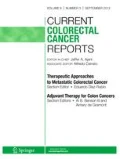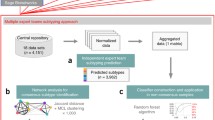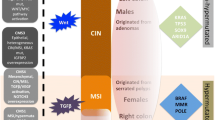Abstract
Although colorectal cancer was one of the first solid tumors to be characterized at the molecular level, a consensus biological classification for researchers and clinicians is lacking. Prognosis and therapy are mainly defined on the basis of patient characteristics and histopathological findings, despite studies showing that, according to mutation and gene-expression profiles, the evolution of colorectal cancer differs substantially, probably because of the high heterogeneity of the disease. In this paper we review the original molecular classifications of colorectal cancer, microsatellite and chromosomal unstable tumors, and more recent attempts to characterize the disease by using intrinsic gene expression clustering methods. These have identified at least three subtypes with different hypermutation, proliferation, and epithelial and mesenchymal features. Furthermore, we discuss preliminary data from evaluation of the potential effect of colorectal cancer subtype on prognosis and treatment response.
Similar content being viewed by others
References
Papers of particular interest, published recently, have been highlighted as: • Of importance
Siegel R, Naishadham D, Jemal A. Cancer statistics, 2013. CA Cancer J Clin. 2013;63:11–30.
Labianca R, Nordlinger B, Beretta GD. Primary colon cancer: ESMO Clinical Practice Guideline for diagnosis, adjuvant treatment and follow-up. Ann Oncol. 2010;21 suppl 5:v70–7.
Sinicrope FA, Sargent DJ. Molecular pathways: microsatellite instability in colorectal cancer: prognosis, predictive, and therapeutic implications. Clin Cancer Res. 2012;18:1506–12.
Vecchione L, Jacobs B, Normanno N, et al. EGFR-targeted therapy. Exp Cell Res. 2011;317:2765–71.
Lengauer C, Kinzler KW, Vogelstein B. Genetic instability in colorectal cancers. Nature. 1997;386:623–7. This seminal manuscript describes the relationship between genetic instability and colorectal cancer.
Grady WM, Carethers JM. Genomic and epigenetic instability in colorectal cancer pathogenesis. Gastroenterology. 2008;135:1079–99.
Malumbres M, Barbacid M. RAS oncogenes: the first 30 years. Rev Cancer. 2003;3:459–65.
McCubrey JA, Steelman LS, Kempf CR, et al. Therapeutic resistance resulting from mutations in Raf/MEK/ERK and PI3K/PTEN/Akt/m-TOR signaling pathways. J Cell Physiol. 2011;226:2762–81.
Miyaki M, Kuroki T. Role of Smad4 (DPC4) inactivation in human cancer. Biochem Biophys Res Commun. 2003;306:799–80.
Baker SJ, Preisinger AC, Jessup JM, et al. p53 gene mutations occur in combination with 17p allelic deletions as late events in colorectal tumorgenesis. Cancer Res. 1990;50:7717–22.
Whalter A, Houlston R, Tomlinsion I. Associations between chromosomal instability and prognosis in colorectal cancer: a meta-analysis. Gut. 2008;57:941–50.
Fearon ER, Cho KR, Nigro JM, et al. Identification of a chromosome 18q gene that is altered in colorectal cancers. Science. 1990;247:49–56.
Ionov Y, Peinado MA, Malkhosyan S, et al. Ubiquitous somatic mutations in simple repeated sequences reveal a new mechanism for colonic carcinogenesis. Nature. 1993;363:558–61. This manuscript explains how MSI can be one of the causes that would lead to carcinogenesis in colorectal cancer.
Liu B, Nicolaides NC, Markowitz S, et al. Mismatch repair gene defects in sporadic colorectal cancers with microsatellite instability. Nat Genet. 1995;9:48–55. This manuscript describes how MSI is associated with mismatch repair gene defects.
Toyota M, Ahuja, Ohe Toyota M, et al. CpG island methylator phenotype in colorectal cancer. Proc Natl Acad Sci U S A. 1999;96:8681–6. This is the first study describing CpG island methylation as an important event in colorectal cancer carcinogenesis.
Ogino S, Nosho K, Kirkner GJ, et al. CpG island methylator phenotype, microsatellite instability, BRAF mutation and clinical outcome in colon cancer. Gut. 2009;58:90–6.
Weisenberger DJ, Siegmund KD, Campan M, et al. CpG island methylator phenotype underlies sporadic microsatellite instability and is tightly associated with BRAF mutation in colorectal cancer. Nat Genet. 2006;38:787–93.
Samowitz WS, Albertsen H, Herrick J, et al. Evaluation of a large population-based simple supports a CpG island methylator phenotype (CIMP) in colon cancer. Gastroenterology. 2005;129:837–45.
East JE, Saunders BP, Jass JR. Sporadic and syndromic hyperplastic polyps and serrated adenomas of colon: classification, molecular genetics, natural history and clinical management. Gastroenterol Clin North Am. 2008;37:25–46.
Gyeon Hoon Kang. Four Molecular subtypes of colorectal cancer and their precursor Lesions. Arch Pathol Lab Med. 2011;135:698–703.
Cancer Genome Atlas Network. Comprehensive molecular characterization of human colon and rectal cancer. Nature. 2012;487:330–7. This is the most extensive genome analysis in colorectal cancer describing the genomic aberrations in this tumor.
Simons JM, Hughes LAE, Smits KM, et al. A novel classification of colorectal tumors based on microsatellite instability, the CpG island methylator phenotype and chromosomal instability: implications for prognosis. Ann Oncol. 2013;24:2048–56.
Domingo E, Ramamoorthy R, Oukrif D, et al. Use of multivariate analysis to suggest a new molecular classification of colorectal cancer. Pathol. 2013;229:441–8.
Perou CM, Sørlie T, Eisen MB, et al. Molecular portraits of human breast tumors. Nature. 2000;406:747–52. Genetic profile widely accepted as classifying breast cancer into four subtypes.
Verhaak RG, Hoadley KA, Purdom E, et al. Integrated genomic analysis identifies clinically relevant subtypes of glioblastoma characterized by abnormalities in PDGFRA, IDH1, EGFR and NF1. Cancer Cell. 2010;17:98–110.
Loboda A, Nebozhyn MV, Watters JW, et al. EMT is the dominant program in human colon cancer. BMC Med Genomics. 2011;4:9. This manuscript describes a genetic profile for colon cancer clearly associated with epithelial and mesenchymal phenotypes, later confirmed by many studies.
Oh SC, Park Y-Y, Park ES, et al. Prognostic gene expression signature associated with two molecularly distinct subtypes of colorectal cancer. Gut. 2012;61:1291–8.
Schlicker A, Beran G, Chresta CM, et al. Subtypes of primary colorectal tumors correlate with response to targeted treatment in colorectal cell lines. BMC Med Genomics. 2012;31(5):66.
Perez-Villamil B, Romera-Lopez A, Hernandez-Prieto S, et al. Colon cancer molecular subtypes identified by expression profiling and associated to stroma, mucinous type and different clinical behavior. BMC Cancer. 2012;12:260.
Sadanandam A, Costas A, Lyssiotis, et al. A colorectal cancer classification system that associates cellular phenotype and responses to therapy. Nature Med. 2013;19(5):619–26. One of the main colorectal subtypes classifications and very important because its implications for treatment in adjuvant and systemic setting and the use of cetuximab.
Budinska E, Popovici V, Tejpar S, et al. Gene expression patterns unveil a new level of molecular heterogeneity in colorectal cancer. J Pathol. 2013;231:63–76.
De Sousa E, Melo F, Wang X, et al. Poor prognosis colon cancer is defined by molecularly distinct subtype and develops from serrated precursors. Nature Med. 2013;19:614–8. Important reference that shows that subtypes are associated with MSI or CIN status and that there is a worse prognosis subtype clearly defined.
Roepman P, Schlicker A, Tabernero J, et al. Colorectal cancer intrinsic subtypes predict chemotherapy benefit, deficient mismatch repair and epithelial-to-mesenchymal transition. Int J Cancer 2013 Jul 13. An important manuscript on the colorectal cancer subtypes that correlates these subtypes with proliferation, EMT, MSI, and response to treatment.
Salazar R, Roepman P, Capella G, et al. Gene expression signature to improve prognosis prediction of stage II and III colorectal cancer. J Clin Oncol. 2011;29:17–24. One of the first genetic profiles to predict prognosis, and the basis for Ref. [33].
Popat A. S, Hueber R, Houlston RS. Systematic review of microsatellite instability and colorectal cancer prognosis. J Clin Oncol. 2005;23:609–18.
Guastedisegni C, Colafranceschi M, Ottini L, et al. Microsatellite instability as a marker of prognosis and response to therapy: a meta-analysis of colorectal cancer survival date. Eur J Cancer. 2010;46:2788–98.
Finak G, Bertos N, Pepin F, et al. Stroma gene expression predicts clinical outcome in breast cancer. Nature Med. 2008;14:518–27.
Mesker WE, Liefers GJ, Jungeburt JM, et al. Presence of a high amount of stroma and downregulation of SMAD4 predict for worse survival for stage I-II colon cancer patients. Cell Oncol. 2009;31:169–78.
Sargent D, Marsoni S, Thibodeau SN, et al. Confirmation of deficient mismatch repair (dMMR) as a predictive marker for lack of benefit from 5-FU based chemotherapy in stage II and III colon cancer (CC). A pooled molecular analysis of randomized chemotherapy trials. Proc ASCO. 2008;26:A4008. This abstract shows that tumors with the MSI phenotype do not benefit from chemotherapy in adjuvant setting.
Lievre A, Bachet JB, Le Corre D, et al. KRAS mutation status is predictive of response to cetuximab therapy in colorectal cancer. Cancer Res. 2006;66:3992–5.
Compliance with Ethics Guidelines
ᅟ
Conflict of Interest
Enrique Sanz-García, Elena Elez, Teresa Macarulla, and Rodrigo Dienstmann declare that they have no conflict of interest. Ramon Salazar has served as a private investigator of international studies for Agendia. Josep Tabernero has received compensation for service as a Consultant from Amgen, Boehringer–Ingeheim, Bristol–Myers Squibb, Genentech, Imclone, Lilly, Merck kgaA, Millennium, Novartis, Onyx, Pfizer, Roche, Sanofi, and Celgene, and has received honoraria for presentations from Amgen, Merck kgaA, Novartis, Roche, and Sanofi.
Human and Animal Rights and Informed Consent
This article does not contain any studies with human or animal subjects performed by any of the authors.
Author information
Authors and Affiliations
Corresponding author
Rights and permissions
About this article
Cite this article
Sanz-García, E., Elez, E., Macarulla, T. et al. Prognosis and Therapeutic Implications for Emerging Colorectal Cancer Subtypes. Curr Colorectal Cancer Rep 10, 55–61 (2014). https://doi.org/10.1007/s11888-013-0205-2
Published:
Issue Date:
DOI: https://doi.org/10.1007/s11888-013-0205-2




